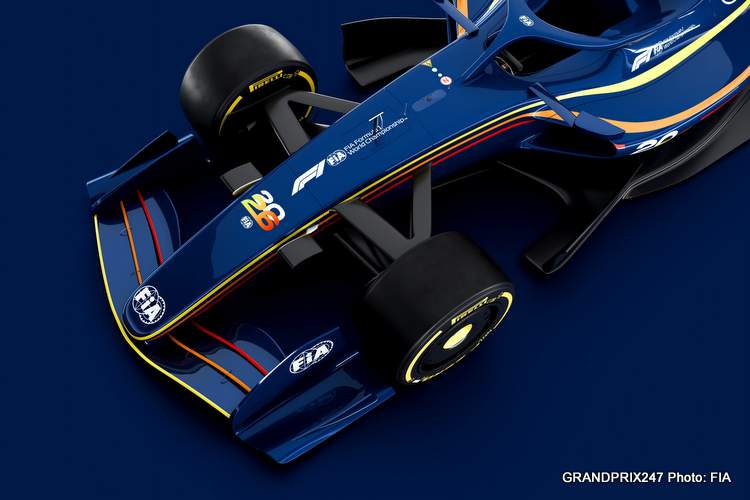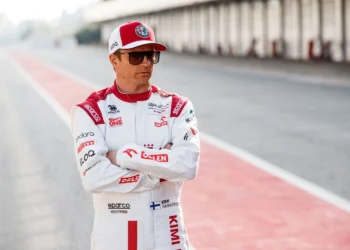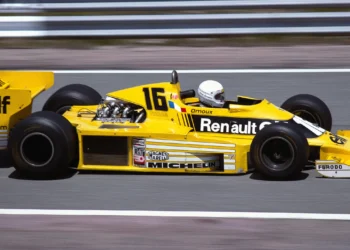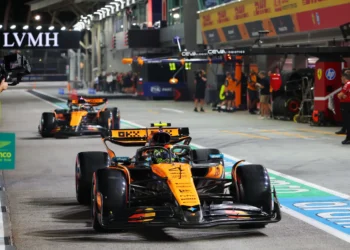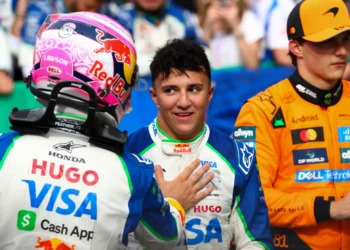At this point, it is important to note that we should not blame the messenger. The International Automobile Federation (FIA) may have issued the regulations, but the Formula One Management (FOM) influenced the F1 working groups responsible for their development, probably delivering them with an implicit understanding. You know, that kind of offer from someone who is armed and you can’t refuse.
Considering that the teams are stakeholders in the FOM, it would be expected that they ensured that the regulations were more aligned with their own ideas. However, doing so would undermine the facade that the FIA has control over this matter. The teams are already hinting that adjustments are necessary. Unfairly, it is the FIA that bears the brunt of public opinion.
It is no secret that modern F1 racing cars are large and difficult to handle. The main culprit is the battery, which is essential to achieve the manufacturers’ goals in the development of hybrid power units. It’s like the tail wagging the dog. This not only results in wider and longer cars, but also makes them challenging to handle on the track. A weight reduction of just 30kg will not make a significant difference, so why bother? Instead, let’s leave it as it is and focus on showcasing attractive paint jobs on the cars.
Do you remember how disappointed you felt on Christmas when the batteries of your new toy car ran out? Now imagine how the drivers will feel when they press the accelerator and experience a lackluster response.
Some have suggested that the function of the Internal Combustion Engine (ICE) will only serve as a generator for the electrical power unit (PU). Although this is already the case, the new regulations only exacerbate this situation. It is speculated that drivers will want to have energy entering the corner to ensure they have the necessary acceleration on the exit.
All of this seems a bit surreal. Regenerative energy management is a distraction from the race and should not be a necessary skill in a driver’s curriculum.
The DRS has been declared dead, although it continues to operate under a new identity. Now called “Zones X and Z,” its goal is to mask the power reduction of the engines by eliminating air resistance and ensuring higher speeds on straight sections. However, this modification will nullify the supposed benefits of overtaking, just like the current DRS trains. However, it is considered the lesser of two evils.
The functionality of the system depends on the synchronized opening and closing of the front and rear wings. The lack of coordination of these movements can have serious consequences for the car’s performance during acceleration, braking, and corners.
The possibility of a system failure cannot be ruled out. It is important to recognize that mechanical or material failures are always a potential risk in Formula 1. However, increasing opportunities for such failures seems contradictory to the safety measures emphasized in the regulations.
Based on the information presented, overtaking in 2026 will continue to heavily depend on the difference in tire degradation, with the additional challenge of the driver’s involvement in the car’s energy regeneration.
This approach does not promote fair competition among drivers, as it lacks the element of direct confrontation. It also places an unfair burden on Pirelli, the Italian tire manufacturer, which often faces criticism for producing inferior quality products despite following the guidelines provided by Formula One Management (FOM). Previous regulations have successfully reduced the gap in lap times between competitors on the grid. Unfortunately, other restrictions have hindered the transformation of this achievement into exciting races.
In conclusion, it seems that once again the ability of Formula 1 to provide exciting races is being sacrificed in favor of promoting the relevance of manufacturers and, consequently, the financial interests of FOM. We can expect more of the same in Spain…
2024
Portugal wins the Eurocup in an exciting victory against Germany
Portugal made history by winning the 2024 Eurocup in an exciting match against Germany. The Portuguese team showed their determination and skill throughout the tournament, and their well-deserved victory is a source of pride for the country.
The final game was played at Wembley Stadium in London and was a fierce battle between Portugal and Germany. Both teams showcased high-level football, but Portugal managed to come out on top and secure a 2-1 victory.
The first goal of the match was scored by Cristiano Ronaldo, who once again showed his brilliance and leadership abilities. The Portuguese player headed the ball into the net at the 30th minute of the first half, driving the crowd wild.
Germany did not give up and continued to press for an equalizer. They had several goal-scoring opportunities, but the Portuguese defense proved solid and managed to hold onto the result until halftime.
In the second half, Portugal extended their lead with a goal from Bernardo Silva in the 60th minute. Germany managed to reduce the deficit with a goal from Leroy Sané in the 75th minute, but it was not enough to avoid defeat.
The Portuguese fans present at the stadium and throughout the country celebrated the victory with great enthusiasm. The streets of Lisbon were filled with a crowd of supporters, singing and dancing in celebration of the title.
The Portuguese coach, Fernando Santos, was praised for his strategy and the way he led the team throughout the tournament. He emphasized the importance of teamwork and the determination of the players to achieve success.
With the Eurocup victory, Portugal solidifies itself as a powerhouse in European football. The team had already won the tournament in 2016 and now clinches the double championship, showing that they are among the best teams on the continent.
The Portuguese players were also individually recognized for their performances during the tournament. Cristiano Ronaldo was elected the best player of the competition, while Bernardo Silva was awarded as the best young player.
Portugal’s victory in the 2024 Eurocup will be remembered as one of the most thrilling moments in Portuguese football history. The team displayed determination, talent, and grit, capturing the hearts of the fans and placing the country at the top of European football.

